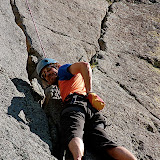The RideStrong group/community/campaign was launched at the Taupo Cycle Challenge last Saturday, under the catch slogan "When the road is a battlefield, join an army." From the RideStrong brochure:
"
With RideStrong you as a cyclist now have a voice.Ride strong is a new cycling community run by
BikeNZ, [
A NZ cycling organisation whose focus was traditionally more on competitive cycling and organised events rather than advocacy. ] dedicated to promoting a safe and enjoyable environment for all cyclists.
It's about giving a voice and a presence to 1.2million cyclists. Cyclists, who have travelled at the whim of fast traffic but idle progress on the problems that affect their cycling environment. And who, for too long, have largely been ignored.
It's clear, if cyclists want to influence and shape the future of cycling then we need to join together out on the road."
It's free to become a member of RideStrong but they do encourage you to take up one of the two paid membership options which give you perks like discounts on gear and perhaps voting rights at BikeNZ meetings --- whatever that entails.
It's nice to see some high profile promoting going on advocating benefits and facilities for cyclists but RideStronger isn't the only organisation advocating for cyclists. CAN --- the Cycling Advocates' Network --- and their various regional bodies such as CAW (Cycle Aware Wellington) have been "giving a voice to cyclists" for a while, turning up at council meetings, pushing for cycle paths and traffic flow improvements and running cycle safety training courses at schools (once the NZ police stopped doing so). So, I'm curious to know what the links are between RideStronger and CAN. It's important that the pro-cycling voice is clear and coherent when it comes to transport planning and advocating for cyclists. Let's hope that's what will happen with RideStronger. It would be great to see an even stronger lobby pushing to make the roads safe for cyclists.














